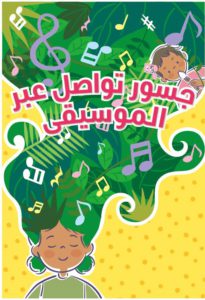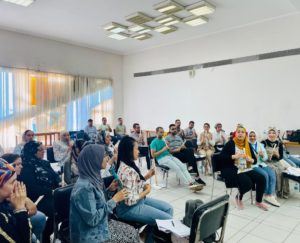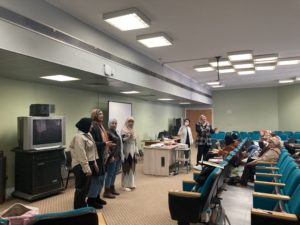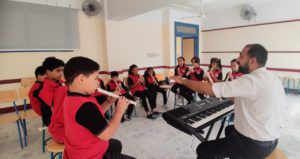■ Project Overview
Yamaha Corporation is engaged in the School Project, which aims to promote activities using music and musical instruments in public education so that children around the world can acquire opportunities to play musical instruments and convey the joy of music and musical instruments. Following on from our activities in 2020, in our second project selected as an EDU-Port Japan Supported Project in 2022, we aim, like before, to introduce activities using music and musical instruments to third and fourth grade elementary school children in Egyptian-Japanese School (EJS) and expand the number of schools where such activities are implemented.
■ Project Progress
◇Development of new teaching materials
As Egypt has a national music curriculum for fourth grade elementary school students, we focused on recorder playing using supplementary teaching materials developed by Yamaha. The third-grade national curriculum, however, does not include music lessons, so together with Tokyo Gakugei University Children Institute for the Future, we developed new teaching materials for third grade students that closely follow Japan’s music textbooks, positioning them as an introduction to music lessons from fourth grade.
In elementary schools in Egypt, generally, 1) music lessons only consist of singing and learning musical grammar (acquiring minimum basic musical knowledge), and 2) lessons are often ‘one way’ from teacher to students. The new teaching materials, therefore, 1) incorporate the same four areas as in Japan (singing, playing Musical instruments, Music making and appreciation), and 2) emphasize dialogue among the students through pair work, group work, etc. By incorporating music education closely following Japanese-style education, we aim to further enhance the students’ musical knowledge and skills and develop their Non-Cognitive skills in the lead-up to fourth grade music lessons.

◇Teacher training using the new teaching materials
Along with the introduction of the new teaching materials, we held an in-person teaching training course in each locality in July 2022 and February 2023. Non-Cognitive skills education requires skills other than the ability to play a musical instrument, such as facilitation that encourages sharing of ideas and dialogue among students and encouragement of verbal communication. Over 40 teachers participated in the training course, not only improving their recorder playing skills and experiencing pair work and group work for themselves, but learning facilitation skills and teaching methods.


◇Expanding Japanese-style music education from 9 schools to 40 schools
Activities using music and musical instruments have been implemented at pilot schools in Egypt since November 2021, and in the second year of the project it was decided to expand the program to all elementary schools with third grade students. In implementing the program, we came one step closer to achieving future sustained collaboration through the purchase of 1,500 recorders by the Egyptian Ministry of Education and Technical Education. Lessons began in a total of 40 schools, including the 9 pilot schools, in November 2022. Both teachers and students seem to be enjoying the new activities and experiences, such as playing music using objects in the classroom, moving to music and expressing music in pictures. New issues have also come to light, however, such as the length of time it takes for the students to form groups due to their lack of familiarity with group work.

Photo courtesy of EJS
■Future plans
◇Presentation
As in the first year of the pilot activities, we are planning to hold a presentation session this year, not in the conventional Egyptian manner of only the most proficient children performing on stage, but as an opportunity for all the children to show the results of their efforts. The emphasis will be on enhancing each student’s sense of accomplishment and motivation and the experience of joining forces to create an event.
While valuing the implementation of presentations by all students and the process of making the preparations on their own initiative, we would like to conclude the year’s activities with each of us experiencing the joy of expression through the use of musical instruments, also by conveying to the teachers the importance of setting content that lets the children feel that they ‘did a good job’ and the importance of working together to make an event a success.
◇Measuring Non-Cognitive skills
Questionnaire surveys and video analysis that were implemented in the first year of the project are planned for 40 schools in the second year. The pre-questionnaire survey was completed before the lessons in November. We are currently asking the teachers to make lesson videos. Most schools in Egypt only have one music teacher and, unlike Japan, ‘jugyo kenkyu’ (a teaching improvement process known as ‘lesson study’) is not common practice. Making and sharing lesson videos is a good way for teachers to get objective feedback on their lessons. The pre-questionnaire survey is also designed to get as many responses as possible.
While it is important to continue our ongoing activities and surveys over the long term, there is still room for improvement of the teaching materials and teacher training. We will watch the lesson videos and conduct local interviews in a continuing effort to find more effective approaches.
Going forward, we will continue to promote Japanese-style music education based on activities using music and musical instruments in Egypt and create an environment in which children can enjoy music and playing instruments, thus contributing to education for all, a goal of the Egyptian government’s Education 2.0 reform plan.







